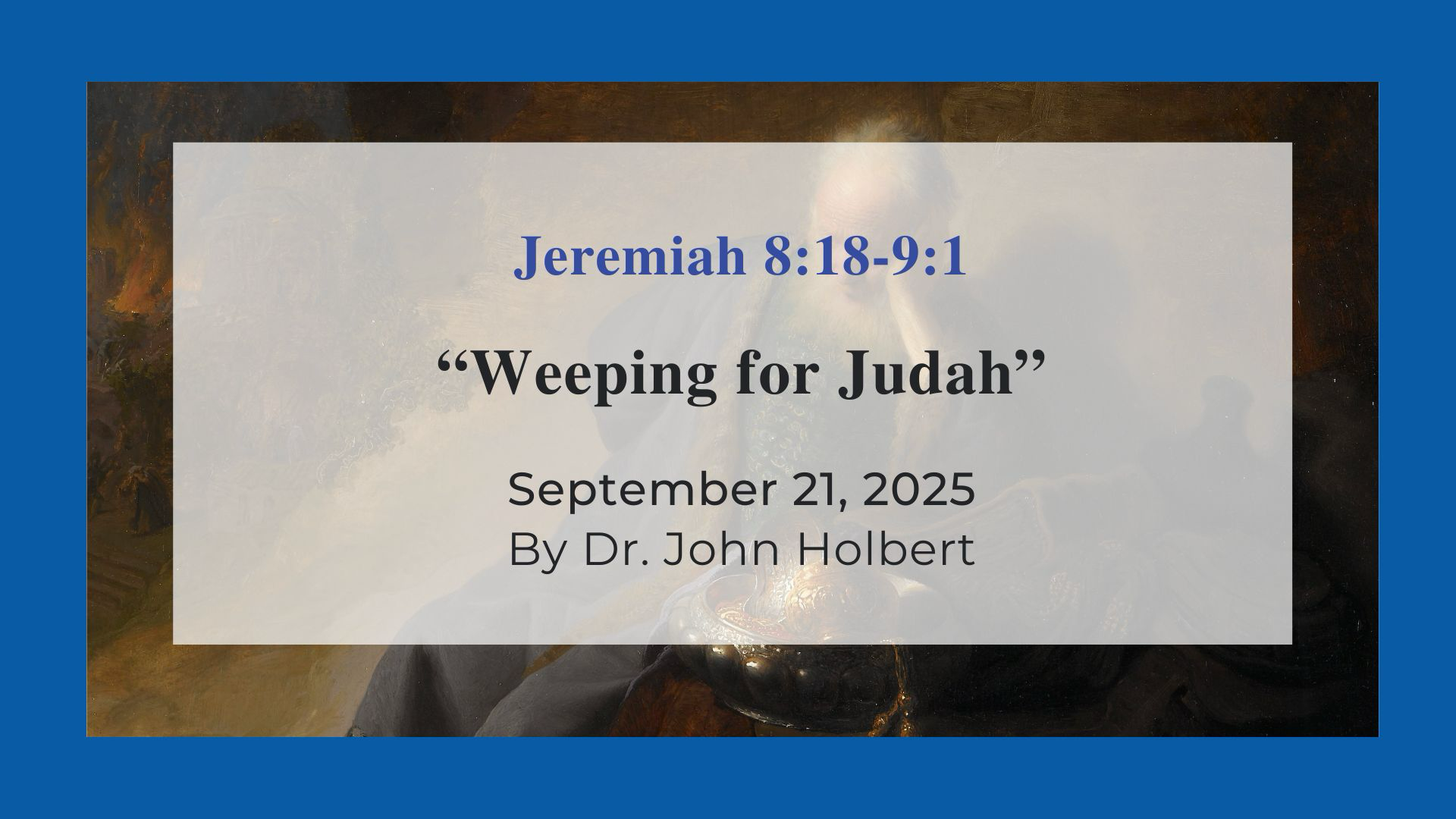Weeping for Judah - Reflections on Jeremiah 8:18-9:1, Pentecost 15, Year C
by John C. Holbert on Friday, June 13, 2025

What makes the prophet Jeremiah unique is his near-constant revelations of his deep emotions. As a scholar of the Hebrew Bible, I must admit that many academic readers of the book wonder whether or not the prophet himself in fact actually had this overt emotionalism, or rather a later student experienced his mentor like that. To say that Jeremiah, the prophet, wept and cursed and shouted at the pain of his calling is to say that this prophet was astonishingly self-revealing in ways that no other prophet of Israel ever was. Whether the prophet was such an open book emotionally, or whether a later follower saw him as such, is finally to me quite irrelevant. The book we have portrays him as such, and I am fully prepared to accept the portrait as given.
We need to clear up a bit of textual confusion before we begin our study: in Hebrew the text is 8:18-23, while in English vs.23 (Hebrew) becomes vs.1 (English), hence the lectionary’s division of the text. And such a wonderful and thrilling text it is!
“My cheer has become grief; my heart is ill” (Jer.8:18). Though the first line of this sentence is very difficult to translate (the NRSV should warn us about the problem!), the essence of the meaning appears to be that the prophet’s usual pleasure has been snatched from him, and that his “heart” (the Hebrew seat of intelligence and will) is sick. The cause of this profound discomfort is revealed in the succeeding lines. “Look! The sound of the outcry of my poor people from everywhere in the land: ‘Is YHWH not in Zion? Is its Ruler no longer there?’” (Jer.8:19a). The Judeans are anxious and troubled about something, and they proclaim with desperation that YHWH seems to have abandoned Jerusalem, and they have been left alone. This pain may have been caused by any number of external threats, chief among them being the armies of the Babylonians bearing down on the city early in the 6th century BCE. Judah was tottering in the face of continual external military incursions, yet those historical problems are not for the prophet the chief cause of Judah’s difficulties.
“Why have they troubled me with their idols, with their trivial images?” (Jer.8:19b). Though many have suggested that this sentence is a later addition to the text of Jeremiah (even my Hebrew text’s apparatus—the suggestions at the bottom of the pages—say “add?”), the sentiment is fully consistent with one of Jeremiah’s major concerns about his Judean people; they have too often turned to idol worship, but when trouble arises, they wonder where the powerful YHWH has gone! And their piteous cries continue: “The summer is past, the harvest is over, and we are not saved” (Jer.8:20). Come on, YHWH, they shout; months have ended, but fears continue still, and your work on our behalf has still not occurred. How long must we endure like this?
But instead of turning to further accusations against the idolatrous Judeans, further enumerations of their absurd YHWH denial and unjust actions in their community, Jeremiah does something else entirely. “For the fractures of my poor people, I am fractured; I mourn, and dismay has seized me” (Jer.8:21). Jeremiah, unlike many of his fellow prophets, does not hurl thunderbolts of censure at the reeling people, but instead identifies with them in their agonies. He does not stand outside of them, a divine prophet called only to assault, but he stands among them, feeling their pain, voicing their anguish.
“Is there no ointment in Gilead; or is no doctor there?” (Jer.8:22a). Gilead, a city across the river Jordan was known for its healing balms and physicians; if such were no longer available in Gilead, the Judeans are destitute indeed. “Exactly why has the health of my poor people not been affected?” (Jer.8:22b). Here Jeremiah indirectly accuses YHWH of dereliction of duty; if Gilead’s ministrations are not available, then why is YHWH not acting for healing and salvation? The prophet feels the people’s pain and loss here quite directly.
“If only my head were filled with water, my eyes a spring of tears, that I might weep day and night for the slain of my poor people!” (Jer.8:23). This is the line that gave to Jeremiah the name of “the weeping prophet,” but he is far more than that. Jeremiah offers to us nothing less than a model for pastoral ministry, if not a model for any and all human interactions. We cannot, as pastors, play our appointed roles unless we can identify, stand in the place of, those we attempt to serve. And even more. If we cannot weep with our people, we finally cannot serve them at all. Too many of us stand too far off from our siblings in Christ, offering to them sage advice or spiritual uplift, but never actually being with them, feeling with them, weeping with them. What finally can we do at the bedside of a dying parishioner save weep at the dying? Words too often fail, while tears speak a human relational truth.
Jeremiah shows us, from his 2700 year old life, how to be more fully human. He actually loved his people, though he regularly chided them severely. It may well be that we cannot earn the right to chide until we first weep. Later Jeremiah’s deep well of emotions will lead him to the very edge of blasphemy (see Jer.20), but here we see his willingness to be one of those people YHWH has called him to address, to “break down” and to “build and plant” (Jer.1:10). Not a bad definition of ministry that, along with the call to weep.
